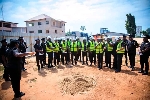V/R: Logistics, public apathy hampering birth and death registration
 An image of a baby boy
An image of a baby boy
Godwin Akpa-Fumey, the Volta Regional IT Officer of the Births and Deaths Registry, has expressed deep concern over the low rate of birth and death registrations in the region, attributing the situation to public apathy, inadequate logistics, and the lack of office infrastructure in several districts.
Speaking in an interview, Mr Akpa-Fumey revealed that registration levels had fallen short of expectations, especially for children under the age of one.
According to him, many parents prioritised their businesses and daily activities over registering their newborns even when officials from the registry visited towns and villages to bring the services closer to the people.
“Patronage of registration in the region is not to our expectation because parents are reluctant these days to register children when we visit the towns and villages. Sometimes they prioritise their businesses over birth registration, which makes our work difficult,” he lamented.
He stressed that the registration of children under one year was crucial, as government planning for child welfare and national development depended heavily on accurate data.
“Parents should be anxious to register their children below one year. That is the most important data the government needs to plan for their growth and future,” he urged.
Mr Akpa-Fumey, also, highlighted a troubling trend regarding death registration, which he described as being on the "loose side.
“Many families,” he explained, “do not see the need to report and register deaths, yet such data is critical for national planning and policy implementation.
“People are not interested in registering death because they don’t see the need. But we need the data to help improve the lives of citizens.”
On logistical challenges, the regional IT officer noted that a lack of motorbikes and other resources hampered field operations, especially in hard-to-reach areas.
He revealed that some districts still operated without proper office infrastructure, making it difficult for staff to work efficiently.
“We need motorbikes to undertake field work, and most districts lack offices, which impedes the working environment of our staff,” he said.
To help bridge the gaps, Mr Akpa-Fumey appealed to non-governmental organisations, development partners, and the private sector to support the registry's efforts, noting that although the government was doing its best, external support was urgently needed to scale up operations and public education.
So far, the region has registered 12,500 children under the age of one and fewer than 3,000 deaths, figures he said coulc be significantly improved with enhanced awareness and support.
Mr Akpa-Fumey called on all parents to prioritise birth registration, not just as a legal requirement, but as a civic responsibility that had far reaching implications for their children’s future.
Trending News

Asiedu Nketia urges prayers and support for President Mahama amid tragedy
08:34
Road crashes surge in 2025: NRSA urges collective action to save lives
20:26
Clergy call for regulation of political prophecies in Ghana
15:11
Margins Group pays tribute to victims of military helicopter crash
00:55
NPP condemns party-affiliated TikTokers over helicopter crash comments
08:21
V/R: Logistics, public apathy hampering birth and death registration
20:17
UCC Professor proposes turning helicopter crash site into tourist attraction
15:02
Turn your grief into a renewed commitment to building a stronger and more united country-Mahama
00:44
V/R: Fire destroys Nogora Pub and shops near Ho Technical University
08:08
IGP breaks ground for construction of new ward complex at Police Hospital
17:02




